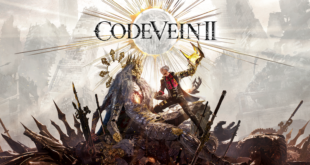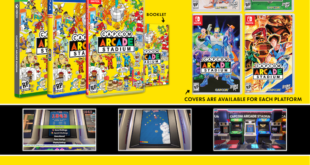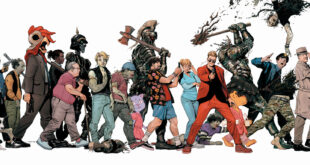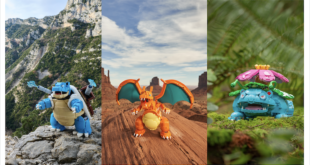The legend lives on in a direct sequel to the SNES classic A Link to the Past- and one of the very best games released this year.

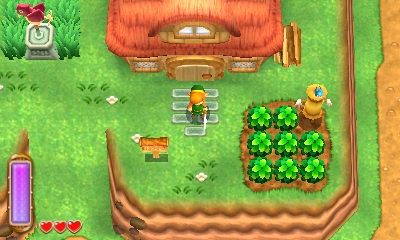
I really hate to call a game an ‘instant classic’. It seems like such an overused term that’s thrown around by seemingly everyone in every region of the entertainment industry. It is, however, the first phrase that comes to mind when I think of The Legend of Zelda: A Link Between Worlds. Now, to be fair, I was a fan of the prequel from way back in the age of 16-bit in the early ’90s. Whether or not that’s tinged my review a bit is fair game for discussion, but any kind of fanboyish thought aside, there’s no doubt that this is a phenomenal game and maybe a game of the year contender.
A Link Between Worlds was originally touted as a sequel to A Link to the Past, but it’s no retread or rehash. And even though it is a sequel, you won’t find the same characters inhabiting the world that you last visited all those years ago. All Zelda titles are linked (ahem) and take place in the same universe more or less, but they usually have radically different settings which isn’t the case here and that’s something new for the series.
I can’t tell you how many times during play that I smiled as I came across a place or structure that I recognized from A Link to the Past. From Link’s house (which is also this Link’s house for some reason), to the royal castle, to the bustling town, to the mysterious Lost Woods; I was in Zelda-fan heaven with a ton of locales that felt like home.
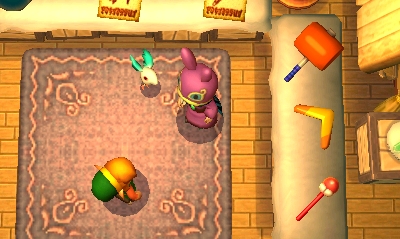
Even though the land of Hyrule is more or less the same one that starred in A Link to the Past, as I hinted at above- this isn’t the same hero. Yes, his name is Link (again) and there’s a Princess Zelda too, but a good deal of time has passed since the events that saw the demon king Ganon vanquished and the world saved. And as you might have guessed, evil is once again on the rise.
A villain named Yuga has appeared from nowhere and seeks to enslave the world under his rule. Yuga has a very particular schtick, that being that he likes to transform his victims into really cool medieval-looking paintings. It’s a trick that becomes one of the main innovations in gameplay in A Link Between Worlds and is used to fantastic effect (read: not gimmicky) throughout.
Shortly after he begins his rampage, Yuga shrouds the castle in darkness and calls forth his armies (who are exact copies of the evil knights from ALttP!). Everything’s going pretty well for him actually, until he runs into the all-new, all-different Link. To make a long story short, everyone’s favorite kinda-elf gets blasted into a painting on the wall. That might not sound all that great for him, but he recovers thanks to a special bracelet that he wears. Using the bracelet, he can then merge into walls as ‘painting Link’ in order to get past obstacles, avoid enemies and otherwise do tons of stuff that you couldn’t otherwise- including traversing rifts between Hyrule and other-dimensional Lorule.
Yes, there’s another kingdom that you’ll need to battle through called Lorule. Yes, it’s exactly what it sounds like; a mirror-universe version of Hyrule. I wouldn’t say that Lorule is exactly the opposite of Hyrule, but it’s pretty close. No one there is all that nice, monsters roam the countryside (some that you’ll instantly recognize from the NES Zelda games) and the whole feel of the place is fairly oppressive. It’s also where Yuga is from, so a trip there to put the kibosh on him and his schemes is pretty much a necessity.
No matter which world you’re currently questing through though, A Link Between Worlds looks about as good as any Zelda title has. Firstly, the game uses the classic Zelda top-down, 3/4 view that the series has been known for throughout the earlier games (excepting Zelda II of course) and the handheld titles. Aesthetically, this is A Link to the Past through and through- just updated with some beautifully drawn characters and landscapes and boosted by some genuinely great use of 3D. For once, I didn’t want to simply switch off the 3D capabilities of the 3DS as it actually adds in an awesome feeling of depth to the game and works beautifully with the viewpoint.
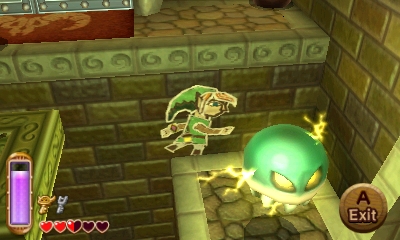
Also right there with the looks is the musical score. If you like the staple Zelda tunes, you’re going to love this. A good deal of the songs that you’ll hear in the game are redone and updated versions of the music that you remember form the NES and SNES Zelda titles. Sheer bliss. I wasn’t so crazy about the sound effects as I thought Link’s voice, and the majority of the snippets of vocal work that the game has (everything actually spoken is in text) were pretty irritating too. Though I have to add that that’s small potatoes when you’re talking about a game that’s otherwise as good as this one is.
Controlling Link is, as you might have guessed, pretty much flawless as well. The control scheme in the game will be instantly recognizable to anyone who’s played a top-down Zelda title and, excepting the painting-Link mechanic, is perfectly and traditionally designed. What is new though is how you attain the famous Legend of Zelda items and weaponry- and how you tackle the various dungeons that you’ll come across.
A new character, Rovio, has set up shop in Hyrule (in Link’s house actually) and it’s through him that you can either rent or buy any of the items that you’re probably more used to ‘finding’ in dungeons. This seemingly minor change alters fundamentally the way you play the adventure though, as you can simply rent all of the items that you need at way cheaper prices than buying them and at any time. With the full inventory unlocked from pretty much the beginning of the game, you’re then free to proceed however you want.
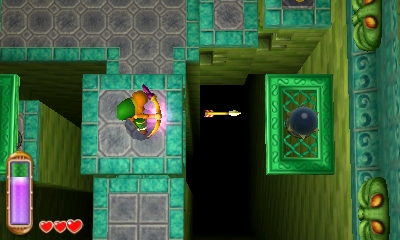
There’s no head into dungeon ‘X’ and find item ‘A’ in order to enter dungeon ‘Y’. That way of doing things goes right out the window as you can simply rent everything you need and get to it in any order. There is one caveat to the rental agreement though; if you’re defeated, Rovio will collect everything from your unconscious form and you’ll have to rent it all over again. It definitely can get annoying to lose all your items and have to fast travel (yep, there’s a fast travel system and it’s very welcome) back to your house to load up again. Buying is definitely preferable in this way, but also way more expensive. Still, just having the options to do what you like, even down to how you acquire your tools, is excellent.
Final Thoughts
I haven’t thoroughly enjoyed a Zelda title this much since A Link to the Past. Even Ocarina of Time and Majora’s Mask (which you’ll spot in Rovio’s shop by the way), which are still super-highly lauded, didn’t hold my interest as much as that one. A Link Between Worlds though, that’s another story.
Everything about this game just screams classic Zelda; from the graphics to the music and the control and all of it’s excellent. A Link Between Worlds is classic Nintendo, through and through. And if you love the thought of that, then you’re going to love your trip through Hyrule, Lorule and everywhere in between.
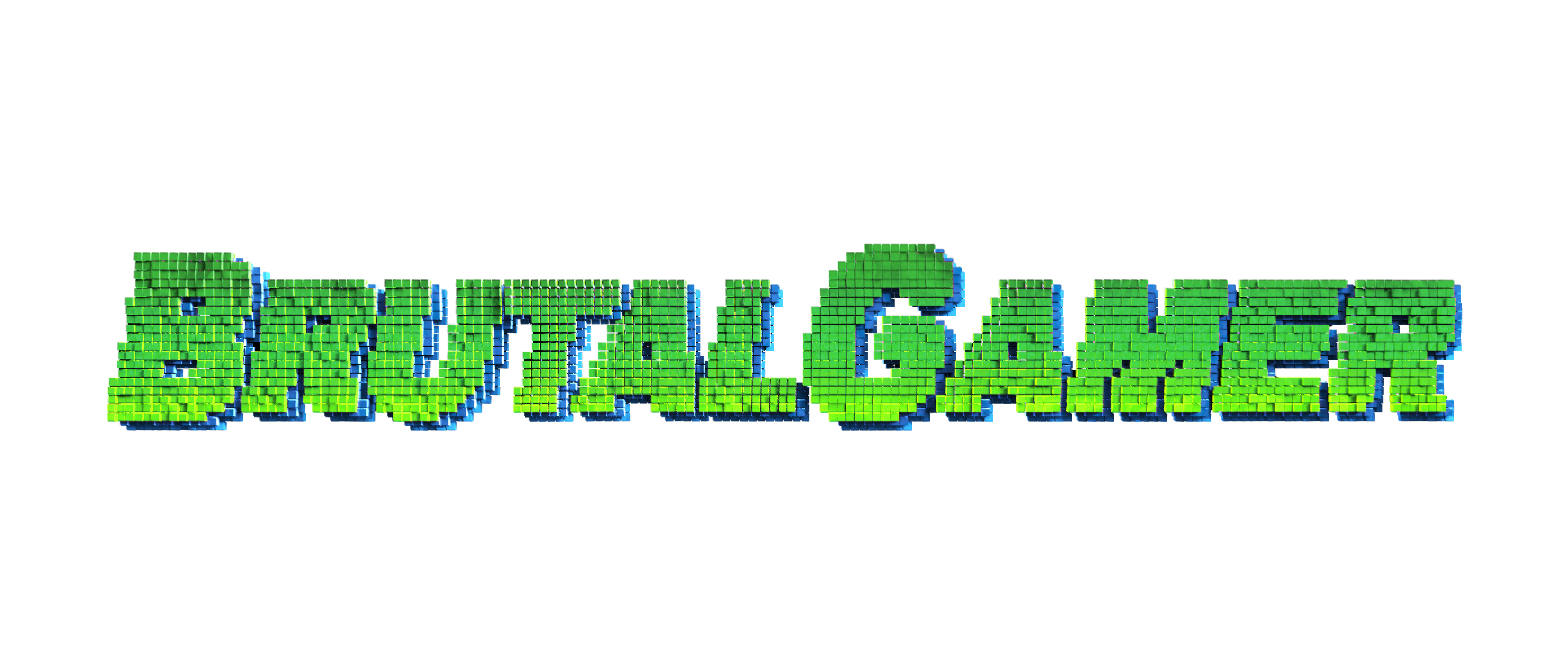 BrutalGamer Bringing you Brutally Honest feedback from today's entertainment industry.
BrutalGamer Bringing you Brutally Honest feedback from today's entertainment industry.

